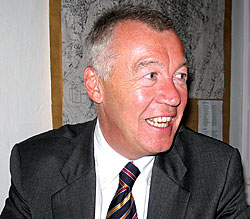 As one of Germany's key development agencies, the German Development Service (DED) contributes over $ 5 million every two years to Nepal but has decided to slash its aid due to the conflict. DED Director Jurgen Wilhelm spoke to us on the importance of democracy and local governance with special emphasis on municipal elections scheduled for February 2006.
As one of Germany's key development agencies, the German Development Service (DED) contributes over $ 5 million every two years to Nepal but has decided to slash its aid due to the conflict. DED Director Jurgen Wilhelm spoke to us on the importance of democracy and local governance with special emphasis on municipal elections scheduled for February 2006.
Nepali Times: DED has been giving special importance to municipal elections due next year. Why?
Jurgen Wilhelm: At the local level, there's a precondition that we must have elected counterparts to be accountable. With elected people in the government, there will be confidence among the people that the policy will be in good hands because they can trust their elected personnel.
Then DED can come in and try to improve the qualification of the administrative staff and infrastructure. But there is so far no elected personnel and only bureaucrats posted in villages by the government. This is why I am keen on the announcement of local elections.
Is DED withdrawing its support in the local governance sector?
Yes because as long as there is no real counterpart, we will withdraw up to 10 persons in different areas. But if there is a positive outcome of hopefully fair and internationally acknowledged local elections next year, we will be ready and willing to improve our engagement in a very short period of time. DED's funding is likely to be slashed from $ 5 million every two years to $ 1 million.
How has the new code of conduct for NGOs affected your local partners?
It has so far not affected our cooperation but we will look into this very carefully once the government really brings this through and implements it, in a serious way. German taxpayers are expecting that they are sending their personnel to make a positive impact in this country. But if there is no chance for DED staff to work for development in this country, we will withdraw our people. Afghanistan, Bangladesh, Vietnam and many other countries are really waiting for our personnel. We have had a big impact in Nepal for the last 35 years and we would love to continue. But when the conditions change tremendously, we have to think about our consequences.
Are you concerned that the role of local government bodies is diminishing?
Democracy has its basis in the grassroots. When in a democracy, the municipalities and local bodies are not working both efficiently and effectively, this is lack of not only democracy but also a lack of acceptance of the entire system by the population. People will lose efficiency in economy, agriculture and so forth. Who can govern the country from only the capital? You must have people at the local level who are elected and not nominated. And it's not because westerners want it but because it has been our experience after 50 years of international cooperation that whenever there is no basic democratic structure existing, the country will fail. This is why the communist and socialist countries failed. Privatisation, democratisation, open economy, participation, a fair open press and opposition are a necessities for the fruitful future development of every country in the world. There is no alternative to democracy whether you like it or not.
Your advice to the policy makers?
The international community is concerned about the situation in Nepal and we strongly ask the government, the king and all the parties involved to try to find a way out of the current unsatisfactory situation in the country.


